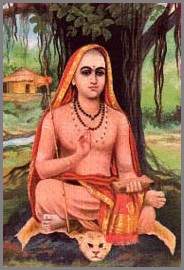
SHANKARA
Seated in a solitary place, free from desires and with senses controlled
one should meditate free of thought on that One Infinite Self.
Shankara was born in 788, the only child of a poor Brahmin couple in Kerala, India.
His father died when he was four and his mother strongly objected to his wish to
become an ascetic. He prevailed and became the disciple of Govinda Bhagavatpada.
At the time, debate was a popular system of resolving differences and Shankara became a
skilled debater. He also wrote brilliant commentaries on the Brahmasutras, the Gita,
and the principal Upanishads which have become the standard. He went on a long pilgrimage
throughout India and set up four monasteries: Kashmir in the North, Dwaraka in the West,
Puri in the East, and Sringeri in the South.
Shankara was foremost a reformer and a uniter. The primary idea he advanced is that God
is the One Reality behind this tempory life. He integrated the teachings of Buddha with
the Vedas, recognizing Buddha as a true Master. He discouraged the practice of magic,
ritual sacrifice, and sexual cults that were polluting and undermining religious life.
He achieved a phenomenal amount of work in his thirty-two years. He gave up his body
in the year 820.
Shankara - Crest Jewel of Wisdom
translated -
To be born a human being is valuable and rare
as only the human being has the discrimination
and free will necessary to aspire to a higher purpose.
The Supreme Reality cannot be understood by studying scriptures,
once the Supreme Reality is understood, the study of scripture
is meaningless.
One cannot reach God by repeating the word God.
No one can free another from bondage, one can only free oneself.
Among all the factors of religious life,
devotion to God stands supreme.
The highest knowledge is knowing the unity of the
individual Self (Atman) and the universal Self (Brahman).
Atman is uncreated and eternal, it dwells within the body,
but does not depend on the existence of a body.
To know Brahman is to know the Self,
and to know the Self is to know Brahman.
Intellectual knowledge and direct knowledge of the
Ultimate Reality are as different as the phantoms
in a dream and waking reality.
The True Self is the changeless reality at the center
of a shifting dream, therefore, fix your mind
on the True Self alone.
The True Self remains always the same, despite karma and its
effect, age and death, only your perception of it changes.
To be born a human being, to have a longing for God,
to find a true Master, and to be able to connect in
meditation, are all gifts of God's grace.
You are the Self, the infinite Being, the pure, unchanging
Consciousness, which pervades everything. Your nature is bliss
and your glory is without stain. Because you identify yourself
with the ego, you are tied to birth and death. Your bondage has
no other cause.
The fool thinks, "I am the body"; the intelligent man thinks,
"I am an individual soul united with the body." But the wise
man, in the greatness of his knowledge and spiritual discrimination,
sees the Self as the only reality and thinks, "I am Brahman."
As the mind becomes gradually established in the Self, it proportionately
gives up the desire for external objects. When all such desires have been
eliminated, there is the unobstructed realization of the Self.
That Reality is One; though, owing to illusion, It appears to be multiple
names and forms, attributes and changes, It always remains unchanged.
[It is] like gold which, while remaining one, is formed into various
ornaments. You are that One, that Brahman. Meditate on this in your mind.

more on Shankara
biography
Crest Jewel
home page
|
|